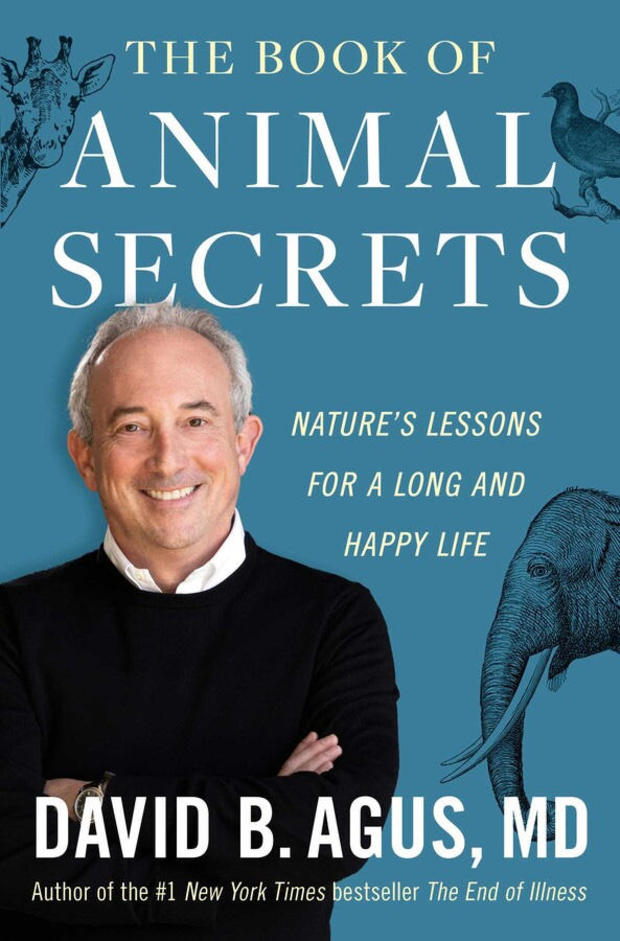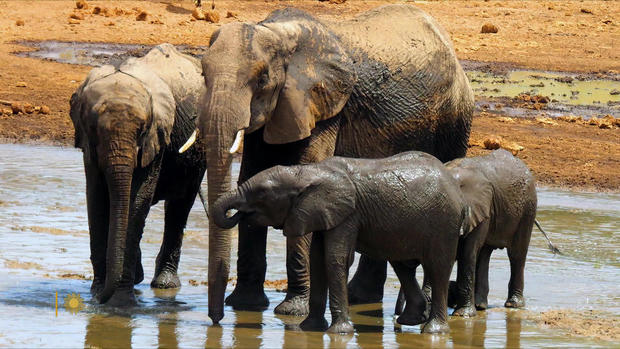
At the Living Desert Zoo & Gardens, in Palm Desert, California, it’s hard not to marvel at giraffes, with their towering height and gentle ways. But it turns out they may be medical marvels as well.
Physician and biomedical researcher Dr. Davis Agus notes that giraffes have a blood pressure of about 280 over 180, more than twice as high as that of a human. “When we, as humans, get elevated blood pressure, we start to have significant heart disease, stroke, kidney problems; that doesn’t happen to a giraffe,” he said.
Agus, the CEO of the Lawrence J. Ellison Institute for Transformative Medicine and a CBS News medical contributor, is also the author of “The Book of Animal Secrets,” published by Simon & Schuster (a part of CBS’ parent company, Paramount Global).
Vigliotti asked, “Do animals really have secrets?”
Simon & Schuster
“Animals don’t have secrets, but they have behaviors that are secrets within them that could help our human health,” Agus replied.
Those lessons can come from across the animal kingdom, whether it’s looking up to birds in our efforts to ward off dementia (“Birds can migrate all over the world and get to where they’re going. They use certain landmarks, So, if you want to retain cognitive function for a long time, you need to do activities that involve pattern recognition and that physical activity”); or dieting and exercising, like a rhino (“The best exercise we can do is on, off, on, off, rather than keep pushing, keep pushing, keep pushing. But it’s the sprint, stop, sprint, stop, which is how a rhino exercises”).
They may seem like small steps, but Agus says that, in the long run, these kinds of changes could alter the course of our lives, and possibly affect what he terms “diseases of civilization,” such as Alzheimer’s, heart disease or cancer. “These are big diseases that basically evolved from our lifestyle,” he said. “We probably can’t prevent them 100%, but we can delay them.”
“Do we find these diseases of civilization in nature?” Vigliotti asked.
“Of course. I mean, we see them occasionally in nature, but they’re much lower frequency and they happen at a much later point in their life. Heart disease, very rare in nature; cancer very rare in nature. And a lot of that is because of their lifestyle.”
Getting to the bottom of those differences has become the life’s work of researchers like Dr. Joshua Schiffman, a professor of pediatric hematology-oncology at the University of Utah, who says, “Each animal has a secret power, has a superpower.”
Schiffman is also the CEO and co-founder of Peel Therapeutics, a biotech company looking to tap into nature’s superpowers to develop treatments for people.
Several years ago, he took a special interest in the elephants at the Hogle Zoo in Salt Lake City. Fewer than 5% of elephants die of cancer, compared to up to 25% of humans. “Look how big they are! One hundred times the size of you and me. That’s one hundred times as many cells. All of these elephants should be dying of cancer, they shouldn’t even be here right now.”
But they are, thanks to what Schiffman calls a superhero gene that fights off cancerous cells. “Instead of two copies of the p53 gene, like humans have – one from mom, one from dad – elephants have 40! Twenty times as much!”
That gene is a focus for Schiffman and his colleagues at Huntsman Cancer Institute in Salt Lake City. There, they study animal cells sent from zoos around the country, and Schiffman says some of these so-called animal secrets could be game-changers.
Schiffman said, “We basically made copies of that p53 gene from elephants, and we put it into human cancer cells. And we watched those cancer cells just explode, just burst. Gone, just shattered like shrapnel, bits and pieces, nothing.”
CBS News
Vigliotti said, “You’re telling me right now that there is a way to translate the success of that genetic success [of elephants], and pass it on to humans?”
“Well, that’s what we’re trying to do,” he replied. “That’s the holy grail. But that’s the idea, right? So, what we need to do is follow nature’s roadmap to preventing cancer.”
Nature’s roadmap might not lead us to a cure for years or even decades, but Agus says animals have plenty of secrets to share in the meantime, if only we are willing to listen, whether it’s things we can learn from dolphins about Alzheimer’s, or from ants about infectious disease. “We’re just scratching the surface of what we can learn from the animal kingdom,” said Agus. “You and I need it. We need to learn more.”
READ AN EXCERPT: “The Book of Animal Secrets” by Dr. David Agus
For more info:
- “The Book of Animal Secrets” by David B. Agus (Simon & Schuster), in Hardcover, eBook and Audio formats, available March 7 via Amazon, Barnes & Noble and Indiebound
- Dr. David Agus, CEO, Lawrence J. Ellison Institute for Transformative Medicine
- Dr. Joshua Schiffman, professor of pediatric hematology-oncology, University of Utah
- Peel Therapeutics
- The Living Desert Zoo and Gardens, Palm Desert, Calif.
- Hogle Zoo, Salt Lake City
Story produced by Sara Kugel. Editor: Remington Korper.

 Latest Breaking News Online News Portal
Latest Breaking News Online News Portal







